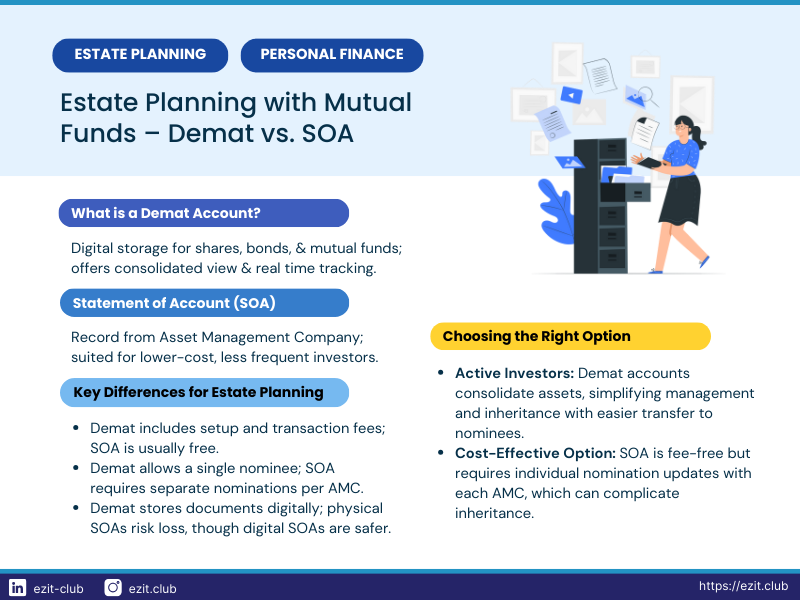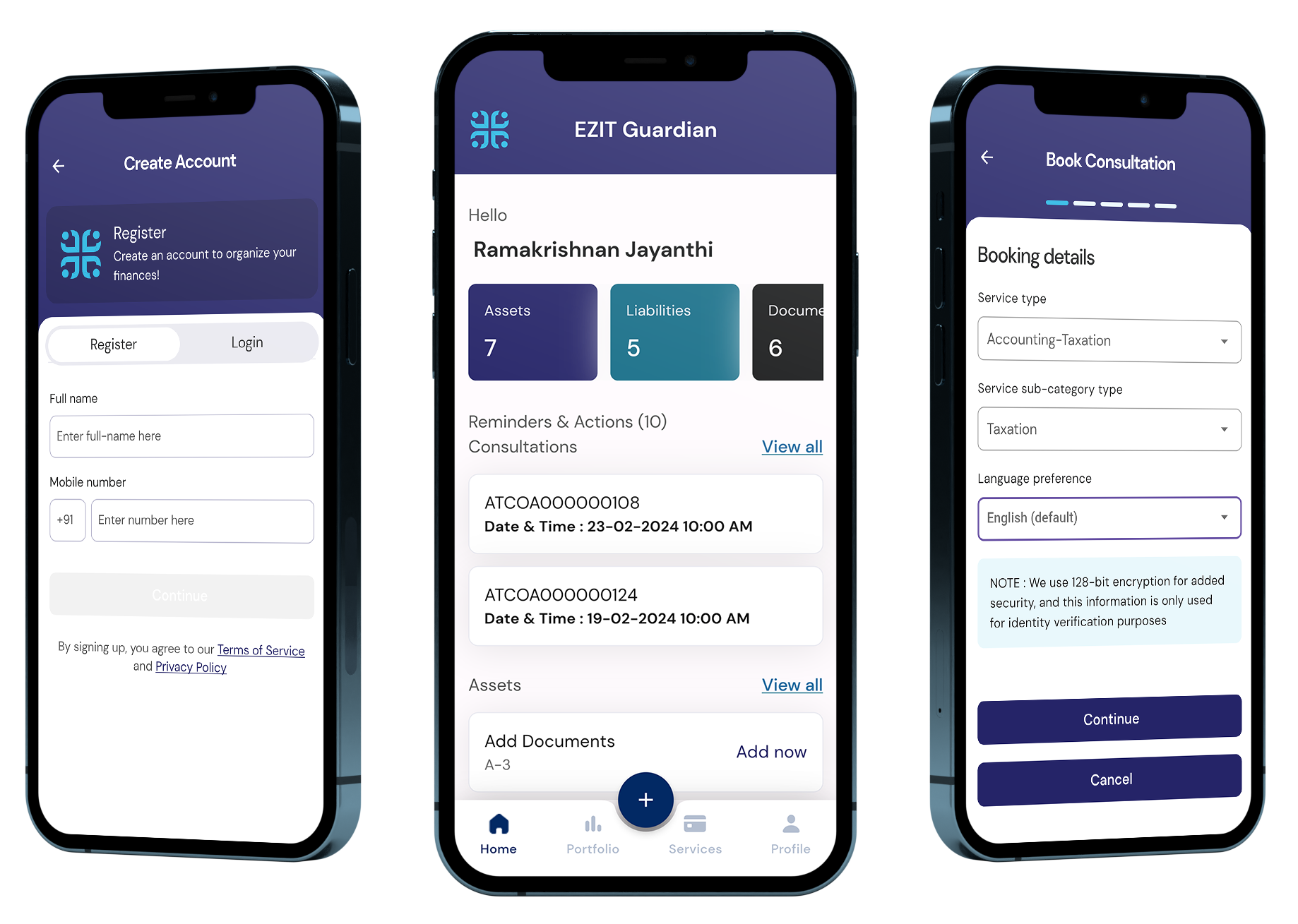TL;DR
Demat vs SOA: Which is better for your mutual funds? Compare both options to make the right choice for managing mutual fund investments and estate planning. Find out what works for your family.
Introduction
As mutual funds become more popular, it’s essential for investors to consider their role in estate planning. Estate planning is a key step in ensuring that your financial assets, including mutual funds, are transferred smoothly to your loved ones according to your wishes. Mutual fund holdings can be managed in two ways for estate planning: by holding units in a Demat account or through a Statement of Account (SOA) from the Asset Management Company (AMC).
This guide compares Demat vs SOA formats for mutual fund investments and how each method impacts your estate planning. We explain the practical differences between holding mutual funds in Demat accounts versus Statement of Account (SOA), and their effects on wealth transfer.
Demat Accounts: A Digital Solution for Mutual Fund Management
A Demat account stores shares, bonds, ETFs, and mutual funds digitally, offering an organized way to manage multiple investments. For estate planning, Demat accounts have unique benefits.
Advantages of Demat Accounts for Estate Planning
- Seamless transfer of assets: With a nominated beneficiary, a Demat account allows mutual funds and other investments to be transferred directly to that individual, simplifying the inheritance process.
- Consolidated view of assets: Demat accounts allow you to see all your investments on one platform, helping heirs to understand and manage the inheritance.
- Real-time monitoring: Demat accounts allow you to track investments easily, which is valuable for estate planning. You can actively manage your mutual fund portfolio and make decisions that support your estate goals.
Disadvantages of Demat Accounts for Estate Planning
- Complex Distribution: If you plan to divide your mutual funds among multiple heirs with specific instructions, it may require multiple accounts or a detailed will.
- Costs Involved: Most Demat accounts include account opening fees, annual charges, and transaction fees, so comparing providers is important to minimize costs.
SOA: A Traditional Approach for Holding Mutual Funds
An SOA or Statement of Account is issued by the AMC and acts as a record of all mutual fund transactions. Investors receive SOAs electronically or by mail, depending on their preference.
Advantages of SOA for Estate Planning
- Low-Cost Option: An SOA doesn’t have maintenance fees, making it a good choice for investors focused on budget-friendly estate planning.
- Flexible Withdrawals: SOA allows for withdrawals based on the exact amount needed, which may help in planning distributions among heirs.
Disadvantages of SOA for Estate Planning
- Manual Processing Required: With SOA, buying or selling mutual funds is more manual than in a Demat account, making it less efficient for active investors.
- Access Issues for Heirs: Physical SOAs can be lost or damaged, and heirs may have difficulty accessing information about the mutual funds.
- Separate Nominations Needed: Each AMC where you hold mutual funds requires its own nomination, which can lead to inconsistencies if not updated regularly.
Demat vs SOA: Which Format Works Better for Mutual Fund Estate Planning
Each method for holding mutual funds has specific features and challenges in estate planning. Here are seven factors to consider when choosing between a Demat account and an SOA for estate planning:
- Trading Activity: A Demat account is ideal for those who trade frequently and want real-time tracking. SOA is suited for investors with a buy-and-hold strategy.
- Cost-Effectiveness: An SOA is a lower-cost option since it typically doesn’t include fees. Demat accounts have annual and transaction fees, which should be compared when considering estate planning.
- Estate Planning Complexity: Demat accounts allow for a single nomination covering all assets, while SOA nominations are done per AMC, which can be time-consuming. Complex estates may benefit from a will and platforms like EZIT.
- Comfort with Digital Platforms: A Demat account provides online access and is more user-friendly for those comfortable with technology. SOA may feel more familiar to investors who prefer physical documentation.
- Record Security: Demat accounts store records electronically, which reduces the risk of physical loss. Physical SOAs may be vulnerable to loss or damage, while electronic SOAs offer better security.
- Ease of Transfer: Demat accounts simplify transfer with a single nomination, while SOAs require separate nominations for each fund company.
- Loan Flexibility: While both Demat and SOA accounts offer loans against mutual funds, SOAs allow more freedom in using the loan for various purposes, unlike Demat accounts, where loans are generally limited to buying securities.
Comparison Table: Demat Account vs. SOA for Estate Planning
| Factor | Demat Account | Statement of Account (SOA) |
|---|---|---|
| Trading Frequency | Best for active investors with real-time tracking | Suitable for long-term or passive investors |
| Cost | Fees for account setup, maintenance, and transactions | Usually free |
| Estate Complexity | Single nomination covers all assets; easier for wills | Individual nominations for each AMC |
| Tech Comfort | Online access; user-friendly for tech-savvy users | Familiar for those who prefer physical documents |
| Record Security | Electronic records reduce risk of loss | Physical SOAs may be lost or damaged; electronic SOA is safer |
| Transfer Simplicity | Single nomination | Multiple nominations across AMCs required |
| Loan Use | Limited to securities purchases | Flexible for various purposes |
EZIT: A Digital Platform for Enhanced Estate Planning
EZIT’s platform can be a valuable addition to your estate planning strategy, especially when managing mutual fund investments. EZIT offers features like secure document storage, nominee management, and access to experts who can guide your heirs through asset transfer.
Key EZIT Features for Estate Planning
- Secure Digital Locker (DocVault): EZIT lets you upload and organize all key documents, such as mutual fund statements, wills, and insurance policies. The digital locker ensures your documents are safe and accessible to your heirs.
- Nominee Management Tools: EZIT allows you to assign nominees to specific documents, giving you control over who can access certain assets.
- Expert Support: EZIT provides access to professionals who can help your heirs navigate the legal, financial, and procedural steps involved in estate management.
Conclusion
Deciding between a Demat account and an SOA for holding mutual funds depends on your estate planning needs, investment habits, and cost preferences. Both Demat and SOA have their pros and cons for estate planning, and platforms like EZIT can support a more organized and secure estate management approach. By carefully considering your priorities and using tools like digital lockers and expert guidance, you can secure your family’s financial future.
EZIT Guardian: Your Partner in Securing Your Family's Financial Well-being
Start your 90-day free trial with EZIT Guardian today and take the first step towards securing your family’s financial future. Download the EZIT Guardian app from the Google Play Store & App Store today to schedule a consultation and take the first step to start securing your legacy.


